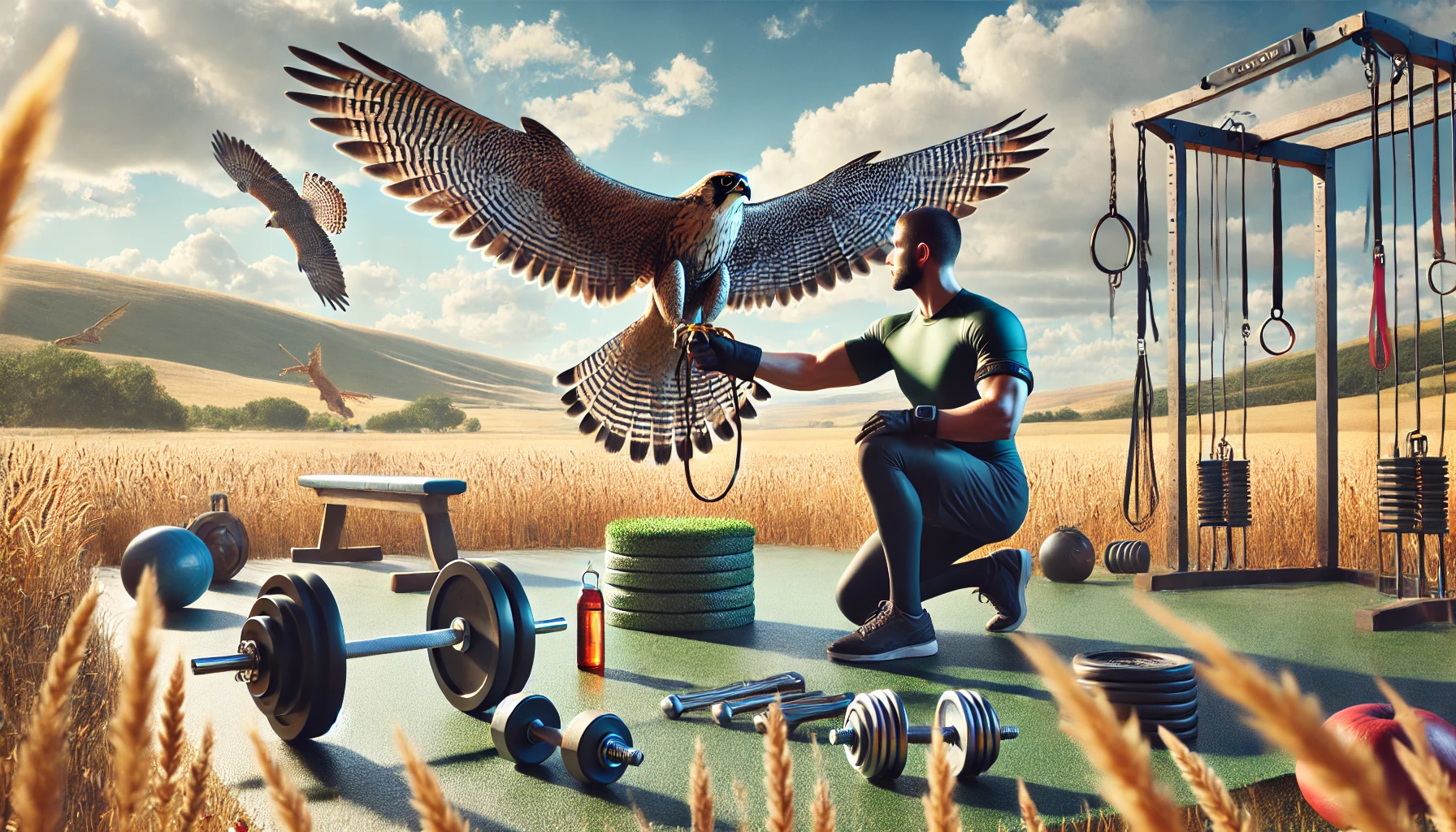Here are the key takeaway points:
- Structured Approach: Training regimens are divided into microcycles focusing on different aspects like speed, resistance, and height.
- Phases: Training includes habituation, endurance, strength, and recovery phases.
- Adaptability: Programs should be tailored to different raptor species’ unique needs and capabilities.
- Monitoring: Continuous tracking of the bird’s performance and health is essential throughout training.
- Duration: Training programs can span several months, including aviary and field training periods.
Soar to New Heights: Why Falcon Fitness Matters
Hey there, fellow falconry enthusiasts! Ever wondered why your feathered friend seems a bit sluggish during training? It might be time to talk about the secret weapon of successful falconers: conditioning and fitness training for your birds of prey.
Let’s face it – a fit falcon is a happy falcon. Just like us, these majestic creatures need to stay in shape to perform at their best. But why should you keep reading about this? Well, buckle up, because we’re about to take you on a high-flying journey through the world of falcon fitness!
In this article, we’ll explore:
- The ins and outs of conditioning your raptor
- Why a well-trained falcon is a joy to work with
- Simple exercises you can start today
- How fitness impacts your bird’s hunting success
Trust me, by the end of this read, you’ll be itching to get your falcon on a fitness plan that’ll make even the most dedicated gym-goers jealous. So, are you ready to take your falconry game to new heights? Let’s dive in and discover how to turn your bird into the aerial athlete it was born to be!
Conditioning and Fitness Training for Falcons
Keeping your falcon in peak physical condition is crucial for successful falconry. A well-conditioned bird is healthier, performs better, and enjoys a higher quality of life. Let’s explore some key aspects of falcon fitness and conditioning.
How to Keep a Falcon in Peak Physical Condition
Maintaining your falcon’s fitness involves a combination of proper diet, exercise, and regular health checks. Here are some essential tips:
- Regular Exercise: Daily flying sessions are crucial. Start with short flights and gradually increase duration and complexity.
- Weight Management: Monitor your falcon’s weight closely. A healthy weight is vital for optimal performance. Learn more about weight management.
- Balanced Diet: Provide a varied diet of high-quality food. This may include whole prey items and supplements as needed. Explore falcon nutrition.
- Health Check-ups: Regular visits to an avian veterinarian can catch potential issues early. Read about falcon health care.
Best Exercises for Falconry Birds
Several exercises can help keep your falcon fit:
- Lure Flying: This classic technique improves agility and speed. Learn lure flying techniques.
- Creance Training: Flying on a long line helps build endurance safely. Discover creance training methods.
- Free Flight: Once your falcon is ready, free flight sessions provide excellent all-around exercise.
- Recall Training: This improves your bird’s response and provides good exercise. Explore recall training techniques.
How Diet Affects a Falcon’s Fitness
Diet plays a crucial role in a falcon’s fitness. Here’s how:
- Protein Content: High-quality protein supports muscle development and maintenance.
- Fat Levels: The right amount of fat provides energy for flight and hunting.
- Vitamins and Minerals: Essential for overall health and immune function.
- Hydration: Proper hydration is crucial for a falcon’s performance. Learn about falcon hydration.
Ideal Training Regimen for a Falconry Bird
An effective training regimen includes:
- Daily Flying Sessions: Start with shorter sessions and gradually increase duration.
- Progressive Challenges: Introduce new challenges to keep your falcon engaged and improving.
- Rest Days: Allow for recovery to prevent overtraining.
- Seasonal Adjustments: Modify training based on the season and your falcon’s molt cycle.
- Personalized Approach: Tailor the regimen to your falcon’s species, age, and individual needs. Explore training techniques for different species.
Remember, every falcon is unique. What works for one bird may not work for another. Always observe your falcon closely and adjust your conditioning program as needed. With patience and consistent effort, you can help your falcon achieve and maintain peak fitness for successful falconry experiences.
Conditioning and fitness training are crucial for falconers and their birds. A well-conditioned raptor is healthier, performs better, and enjoys a higher quality of life. Regular exercise, proper nutrition, and careful weight management form the foundation of an effective conditioning program.
Final Thoughts
Remember, each bird is unique. Tailor your approach to your raptor’s specific needs, considering factors like species, age, and hunting style. Patience and consistency are key – results won’t happen overnight, but the rewards of a fit, responsive hunting partner are well worth the effort.
By embracing these principles, you’ll not only improve your bird’s physical capabilities but also strengthen the bond between falconer and raptor. So, take flight with confidence, knowing you’re giving your feathered companion the best chance to thrive in the challenging world of falconry.



